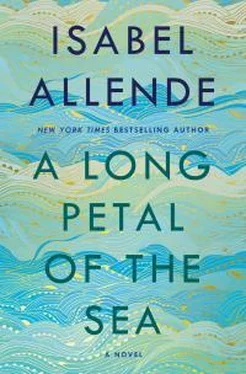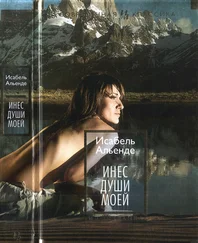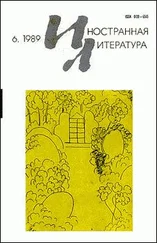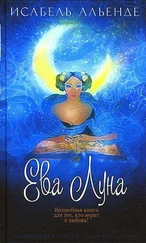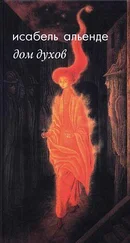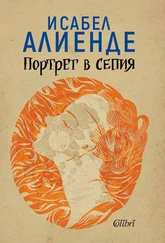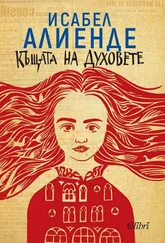The last stage of her pilgrimage was the same voyage down the Pacific that her family had taken in 1939. Her son had sent her enough money to travel first-class, arguing that she deserved it after all the hardships she had suffered, but she preferred to travel tourist-class, where she would be more at ease. The war and her years as a smuggler had made her very discreet, but she resolved to speak to strangers, since she had discovered that people like to talk, and it only took a couple of questions to make friends and find out lots of things. Everybody had a story and wanted to tell it.
Gosset, who had been suffering from the aches and pains of old age, was gradually rejuvenated. By the time they were approaching Chile, he was a different dog, more alert and smelling less like a skunk.
Victor, Roser, and Marcel were there to receive the grandmother and her dog in the port of Valparaiso. They were accompanied by a stout, talkative gentleman who introduced himself as “Jordi Moline, at your service, madame.” He added in Catalan that he was ready to show her the best this beautiful country had to offer. “Do you realize you and I are almost the same age? I’m a widower too,” he said rather coquettishly.
On the train to Santiago, Carme learned about how Jordi had adapted perfectly to the role of great-uncle. By now Victor was a cardiologist in the San Juan de Dios hospital, and so no longer worked nights in the Winnipeg. Roser was busy with her music, although she still kept an eye on the accounts. Marcel went almost every day to the bar to do his homework, and so as not to be at home alone.
—
IN THE MID-1960S, Roser traveled to Caracas, invited once more by her friend Valentin Sanchez, the former Venezuelan ambassador, who by this time was retired from diplomacy and devoted himself entirely to his passion for music. In the twenty-five years that had elapsed since the arrival of the Winnipeg, Roser had become more Chilean than anyone born in that country. The same was true of the majority of the Spanish refugees, who were not only citizens, but many of whom fulfilled Pablo Neruda’s dream of rousing Chilean society from its slumbers. By now nobody remembered there had once been opposition to their arrival, and nobody could deny the magnificent contribution made by the people Neruda had invited to Chile. After years of planning, extensive correspondence, and many trips, Roser and Sanchez had succeeded in creating the Ancient Music Orchestra, the first of its kind on the continent, sponsored by oil, the inexhaustible treasure gushing out of the Venezuelan earth. While he traveled across Europe acquiring precious antique instruments and digging out unknown scores, she trained the musicians through a strict selection process from her position as vice-rector of the National Conservatory of Music. There were more than enough candidates who came from different countries in the hope of becoming part of this utopian orchestra. Chile didn’t have the means to support such an enterprise—there were other priorities in the cultural field, and on the few occasions Roser managed to awaken interest in the project, there would be another earthquake, or a change of government, and her hopes would be dashed. But in Venezuela, with the right influence and connections, any dream was possible. Valentin had plenty of both, as he had been one of the few politicians capable of navigating safely through dictatorships, military coups, attempts at democracy, as well as the compromise government then in power, with a president who was one of his personal friends. His country was struggling against a guerrilla group inspired by the Cuban revolution, like many others on the continent, apart from Chile where a revolutionary movement that was more theoretical than real was just in its infancy. However, none of this affected Venezuela’s prosperity or the love Venezuelans had for music, ancient or not. Valentin often visited Chile, where he kept an apartment in Santiago that he could use whenever he felt like it. Roser paid him visits in Caracas, and they had traveled to Europe together on orchestra business. She had learned to travel by plane thanks to tranquilizers and gin.
This friendship didn’t trouble Victor Dalmau because he knew that his wife’s friend was openly homosexual, but he suspected there could be a hypothetical lover. Each time Roser returned from Venezuela she was rejuvenated. She came back with new clothes, perfumed like an odalisque, or wearing a discreet jewel, a gold heart hanging round her neck from a slender chain, none of which she would buy for herself, as she was Spartan when it came to personal spending. What was most revealing for Victor was her renewed passion, as if when they met again she wanted to try out some acrobatics she had learned with another man, or else atone for her guilt. To be jealous would have been ridiculous in the relaxed kind of relationship they had, so relaxed that if Victor had to define it, he would have said they were comrades. He discovered the truth of his mother’s saying that jealousy bites worse than fleas. Roser enjoyed the role of wife. In the days when they were poor and he was still in love with Ofelia del Solar, without telling him, she bought two wedding rings in monthly installments, and demanded they both wear them until such day as they could divorce. According to the agreement they had made at the start always to tell each other the truth, she ought to have told him about her lover, but she was of the belief that a kind omission is worth more than a pointless truth, so Victor deduced that if she applied this principle to small things, all the more reason she would do so when it came to being unfaithful.
Theirs was a marriage of convenience, but they had been together for twenty-six years, and loved each other with something more than the quiet acceptance of an arranged marriage in India. Marcel had reached eighteen long ago, the birthday that was supposed to mark the end of the commitment they had made to be together, but it merely served to underscore their mutual affection and their intention to stay married awhile longer, in the hope that they would never part.
Over the years they became increasingly close in their tastes and foibles, but not in character. They had few reasons to argue and none to fight; they agreed about all things fundamental and felt as much at ease together as if they were on their own. They knew each other so well that making love for them was an easy dance that left them both contented. They didn’t repeat the same routine, because that would have bored Roser, as Victor well knew. The Roser naked in bed was very different from the elegant, sober woman up on a stage, or the strict professor at the Conservatory of Music. They had been through many ups and downs together before they reached the placid years of maturity when they had no great economic or emotional worries.
They lived on their own, as Carme had moved to Jordi Moline’s house after the death of the very old, blind, and deaf Gosset, who remained lucid to the last. Marcel was living with two friends in an apartment. He had studied mining engineering, and was working for the government in the copper industry. He had not inherited the least trace of the musical talent of his mother or his grandfather Marcel Lluis Dalmau, the fighting spirit of his father, nor any inclination toward medicine like Victor or for teaching like his grandmother Carme, who at eighty-one was still a schoolteacher.
“How strange you are, Marcel! Why on earth are you so interested in stones?” Carme asked him when she learned of his chosen career.
“Because they don’t have opinions or talk back,” her grandson retorted.
—
HIS FAILED RELATIONSHIP WITH Ofelia del Solar left Victor Dalmau with a silent, suppressed anger that persisted for several years. He interpreted it as atonement for having behaved so cruelly, for having allowed that young virgin to fall in love with him when he knew he wasn’t free, but had responsibility for a wife and child. That had been a long time ago. Since then, the burning nostalgia left by that love gradually merged into that gray area of memory where what we have lived fades away. He sensed he had learned a lesson, although the precise meaning of that lesson wasn’t clear to him. For many years, that was his only amorous adventure, as he was constantly overwhelmed by the demands of his work. The occasional hasty encounter with a willing nurse didn’t count; this happened only rarely, usually when he was on duty for two successive days at the hospital. Those furtive embraces never created a complication: they had no past or future, and were forgotten within hours. His unshakable affection for Roser was the anchor of his existence.
Читать дальше
